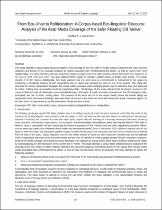From eco-jihad to politicization: A corpus-based eco-linguistic discourse analysis of the arab media coverage of the safer floating oil tanke
Abstract
This study attempts a corpus-based discourse analysis of the coverage of the FSO Safer in Arabic media to determine the main recurrent categories and themes in the coverage produced by outlets associated with conflicting/warring parties, as well as reports from more neutral media. This study, therefore, provides analysis of media coverage on the FSO Safer starting with the first report from Aljazeera on the issue in 2019, until June 2022. This study utilized Sketch Engine to compile a digital corpus of Arabic news articles. The corpus consists of 47,317 tokens. Additionally, this study explores how the word al-bī’ah (environment) is represented in the corpus by conducting a transitivity analysis of each concordance line or clause that included the word or one of its variants. This study also examines the various manipulative strategies that media outlets associated with conflicting parties used to determine how each presented the 'other', holding them accountable should the catastrophe strike. The findings of this study indicated that the themes recurrent in the corpus include the scale of catastrophe, environmental damage in the event of a spill, economic consequences, the UN emergency plan, echo-jihad, and 'we' vs 'them', among others. The presence of the word al-bīah in the corpus clearly shows that human beings are represented as the most active of beings; those who think, do and act in the world and those who behave and speak. Inanimate objects, on the other hand, are represented as passive participants; things are done to them

